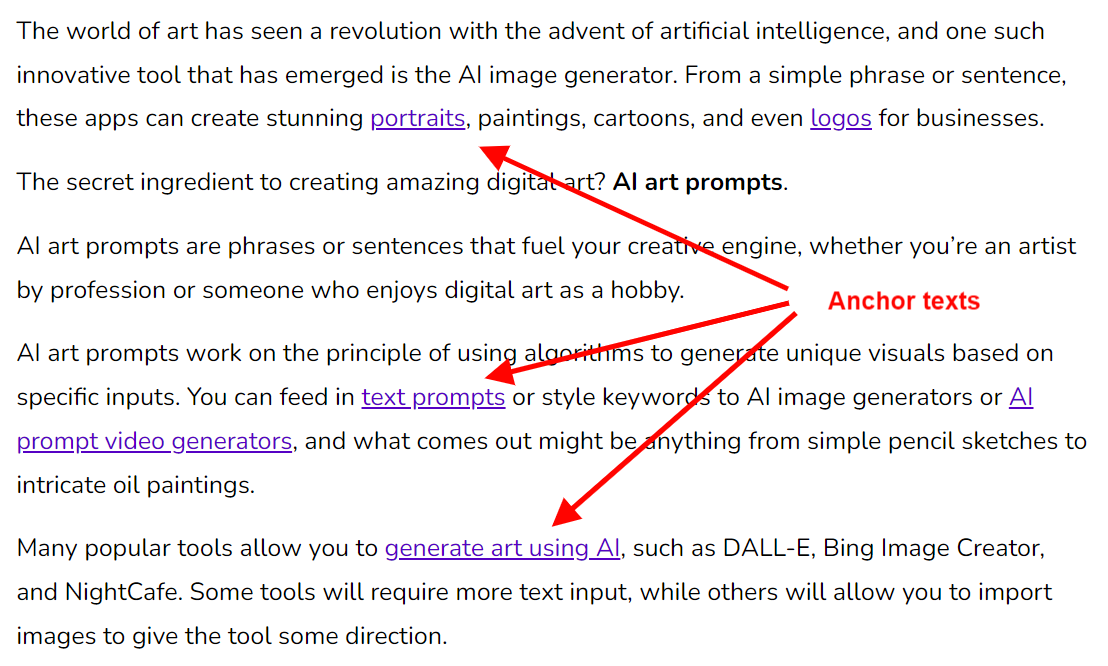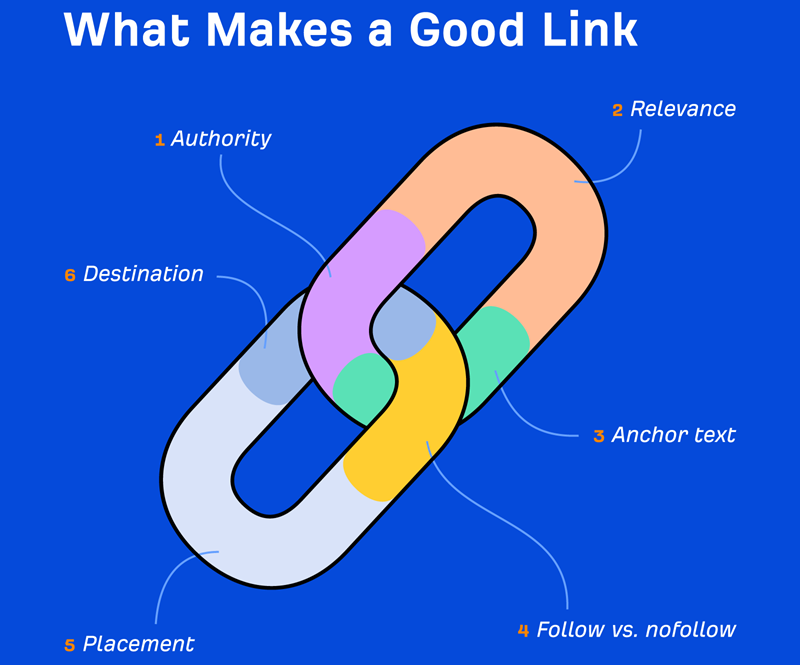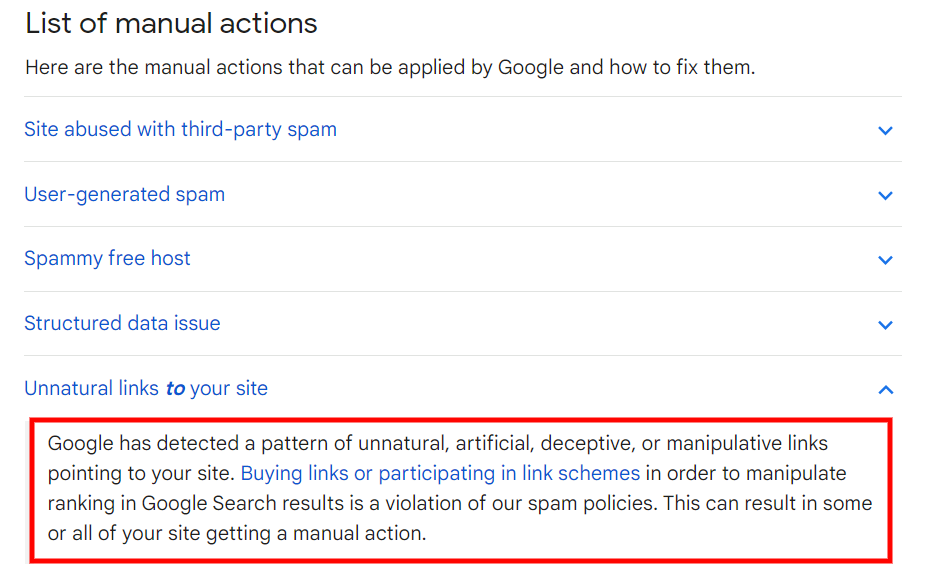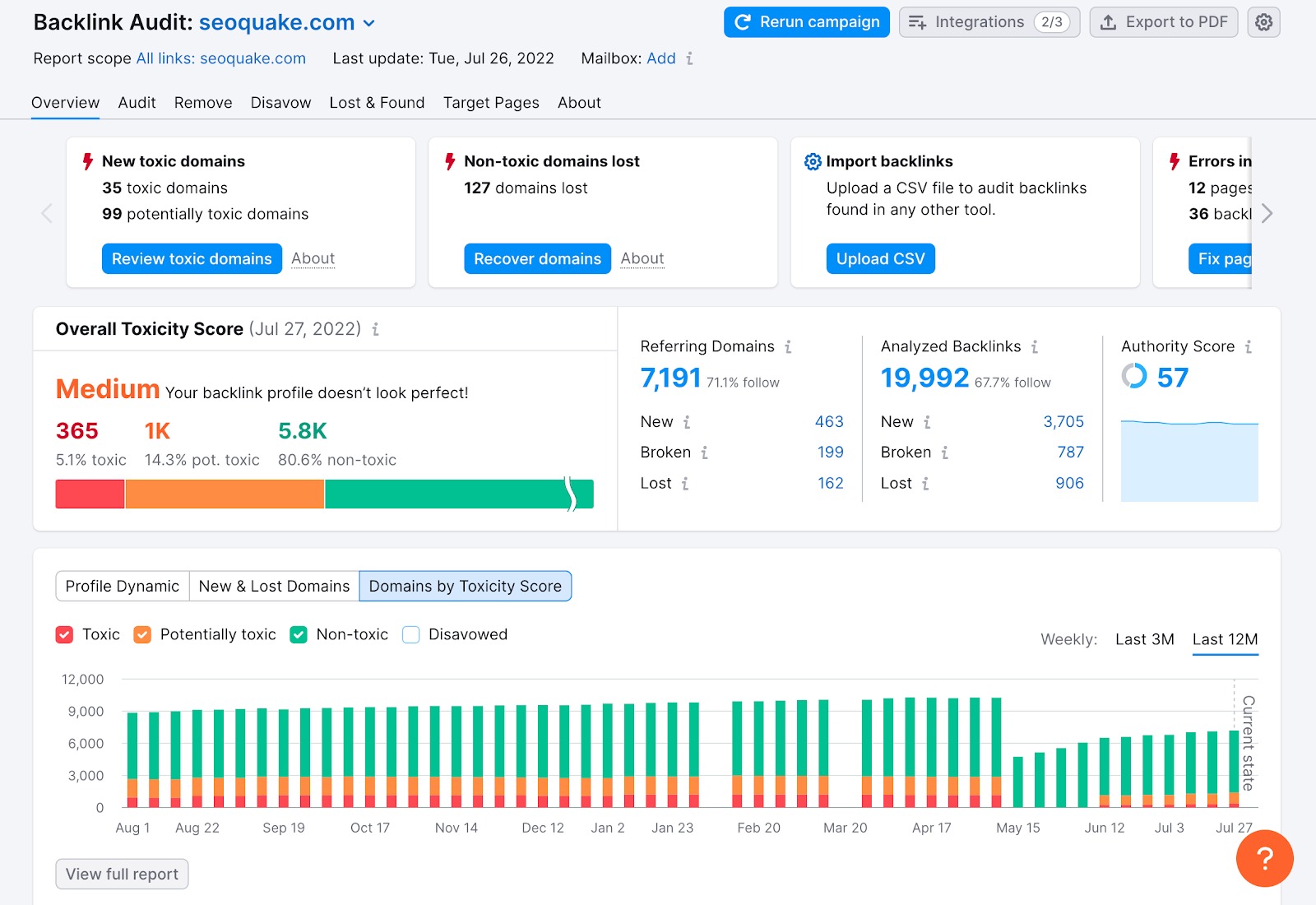Ever wondered why some websites rank better than others? It’s not just about content or keywords; it’s also about who links back to you. A high-quality backlink is like a thumbs-up from the web, telling search engines, “Hey, this site’s got good stuff.” But getting these nods of approval isn’t as simple as asking nicely or crossing your fingers.
In the digital jungle, only the smartest survive. You need tactics that are sharp enough to secure those valuable backlinks without getting penalized by Google’s ever-watchful eyes.
Let’s break down what makes a backlink high-quality and how to get these sources to mention your site.
Table Of Contents:
- What Makes a Backlink High Quality?
- How Quality Backlinks Impact Search Engine Rankings
- 9 Proven Strategies to Earn Quality Backlinks
- Common Mistakes to Avoid When Building Quality Backlinks
- Best Practices for Maintaining a Healthy Backlink Profile
- FAQs – Quality Backlink
- Conclusion
What Makes a Backlink High Quality?
Not all backlinks are created equal. Some will skyrocket your rankings, while others can actually hurt your SEO. So what separates the good from the bad?
Here are the top 5 factors that determine the quality of a backlink:
1. Relevance to Your Website
A high-quality backlink should come from a website that is relevant to your niche or industry. The more closely related the linking site is to your content, the more valuable the backlink will be in the eyes of search engines.
For example, if you run a fitness blog, a backlink from a health magazine or a popular fitness influencer’s website would carry much more weight than a link from a random tech blog.
2. Authority of the Linking Domain
The authority of the website linking to you plays a significant role in determining the quality of the backlink. Links from well-established, trusted websites carry more weight than those from new or low-authority sites.
Domain authority can be measured using tools like Moz’s Free Domain Authority Checker or Ahrefs’ Website Authority Checker. Generally, the higher the score, the more valuable a backlink from that domain will be.
3. Placement and Context
The placement and context of the backlink within the linking page also contribute to its quality. A link embedded naturally within the main content of a page is considered more valuable than a link in the footer or sidebar.
Additionally, the surrounding text and context should be relevant to your content. If the linking page discusses a topic related to your website, and your link is included as a valuable resource, that’s a strong signal of a high-quality backlink.
4. Anchor Text
The anchor text, which is the clickable text used for the backlink, should be relevant to your content and not overly optimized. Using exact match anchor text excessively can be seen as a manipulative tactic by search engines.
Instead, aim for natural, descriptive anchor text that accurately reflects the content being linked to. A mix of branded, keyword-rich, and generic anchor texts is ideal for a healthy backlink profile.

5. Follow vs. Nofollow Links
Follow links, also known as dofollow links, pass link equity (or “link juice”) from the linking page to your website, helping to boost your search engine rankings. Nofollow links, on the other hand, do not pass link equity but can still drive referral traffic.
While follow links are generally more desirable, a natural backlink profile should include a mix of both follow and nofollow links. An overabundance of follow links can appear unnatural to search engines and may trigger a manual review or penalty.
By focusing on these key factors, you can ensure that the backlinks you acquire are high-quality and will have a positive impact on your search engine rankings. Remember, when it comes to backlinks, quality always trumps quantity.

How Quality Backlinks Impact Search Engine Rankings
You already know that backlinks are a major ranking factor for search engines like Google. But did you know that the quality of those backlinks matters even more than the quantity?
That’s right, a few high-quality backlinks can do wonders for your search engine optimization (SEO) efforts and help you rank higher in search results.
Let’s dive into exactly how quality backlinks can impact your SERP rankings.
Improved Search Engine Visibility
When you earn quality backlinks from authoritative websites, search engines view your site as more credible and trustworthy. This can lead to improved visibility in search engine results.
In fact, a study by Backlinko found that the number of referring domains (unique websites linking to your site) has a strong correlation with higher rankings in Google’s search results.
Increased Referral Traffic
Quality backlinks not only boost your search engine rankings but also drive referral traffic to your website. When users click on a link from another reputable site, they’re more likely to engage with your content and potentially convert into customers.
Referral traffic from backlinks can account for up to 40% of a website’s total traffic. That’s a significant chunk of potential visitors you don’t want to miss out on.
Builds Authority and Credibility
When high-authority websites link to your content, it’s like receiving a vote of confidence. Search engines and users alike perceive your site as more authoritative and credible in your niche.
This can lead to a virtuous cycle where more websites are willing to link to your content, further cementing your authority and improving your search engine rankings.
Faster Indexing of New Pages
Quality backlinks can also help search engines discover and index your new pages more quickly. When a reputable site links to a new page on your website, search engine crawlers follow that link and find your content faster.
This means your new pages can start ranking and attracting organic traffic sooner, giving you a competitive edge in your niche.
9 Proven Strategies to Earn Quality Backlinks
Now that you know what makes a backlink high quality and how it impacts your SERP position, how do you earn those coveted high-authority backlinks?
Here are 9 proven strategies to help you acquire backlinks that can boost your search engine rankings:
1. Create Linkable Assets
One of the most effective ways to earn quality backlinks is by creating valuable, informative, and engaging content that other websites will naturally want to link to. This can include in-depth blog posts, infographics, videos, research studies, or interactive tools.
By providing unique and useful content, you increase the likelihood of attracting organic backlinks from other websites in your niche.
2. Guest Post on Relevant Websites
Guest posting involves writing content for other websites in your industry. By contributing high-quality articles to reputable websites, you can include a backlink to your own site within the content or author bio.
This not only helps you earn a quality backlink but also exposes your brand to a new audience and establishes you as an authority in your field. Just make sure to choose websites that are relevant to your niche and have a solid domain authority.
3. Broken Link Building
Broken link building is a tactic that involves identifying broken links on relevant websites and reaching out to the site owners to suggest replacing the broken link with a link to your content.
This benefits the linking website by fixing its broken link and provides you with a quality backlink in the process. Tools like Ahrefs’ Broken Link Checker can help you find broken links efficiently.
4. Skyscraper Technique
The skyscraper technique involves finding popular content in your niche, creating a superior version of that content, and then reaching out to websites that have linked to the original content, suggesting they link to your improved version instead.
By providing a more comprehensive, up-to-date, or visually appealing resource, you increase the chances of earning high-quality backlinks from websites that have already demonstrated an interest in the topic.
5. Create Shareable Infographics
Infographics are highly shareable and can be an effective way to earn backlinks. Create informative and visually appealing infographics related to your niche, and then reach out to websites that have shared similar infographics in the past.
Offer them the opportunity to share your infographic with their audience, with a link back to your website as the source. This can help you earn multiple high-quality backlinks from a single piece of content.
6. Write Testimonials
If you use and enjoy products or services related to your industry, consider providing testimonials for those companies. Many businesses feature customer testimonials on their websites and often include a link back to the customer’s website.
This can be an easy way to earn a quality backlink while also building relationships with other businesses in your niche. Just make sure to only provide genuine testimonials for products or services you actually use and recommend.
7. Unlinked Brand Mentions
Monitor the web for mentions of your brand, products, or content that don’t include a link back to your website. You can use tools like Mention or Google Alerts to track these mentions.
Reach out to the website owners and politely request that they add a link to your site. Since they have already mentioned your brand, they may be more likely to add the link, providing you with a quality backlink.
8. Competitor Backlink Analysis
Analyze your competitors’ backlink profiles to identify opportunities for your own link-building efforts. Tools like Moz Link Explorer can help you discover the websites linking to your competitors.
You can then target those same websites with your own content or outreach efforts to earn similar backlinks. This strategy can be particularly effective if you identify competitors’ backlinks from high-authority websites in your niche.
9. Resource Page Link Building
Many websites have resource pages that curate helpful links and tools related to a specific topic. Find resource pages in your niche and reach out to the website owners, suggesting your content as a valuable addition to their page.
If your content is a good fit and provides value to their audience, they may add a link to your website, providing you with a targeted, high-quality backlink. To find relevant resource pages, try searching for your keyword + “resources”, “useful links”, or “helpful tools”.
By implementing these proven strategies and consistently working on your link-building efforts, you can gradually build a strong backlink profile that will help your website rank higher in search engine results pages and drive more organic traffic to your site.
Common Mistakes to Avoid When Building Quality Backlinks
While link building is essential for SEO success, not all tactics are created equal. In fact, some common link-building mistakes can actually harm your website’s search engine rankings and reputation.
To help you stay on the right track, here are 5 common mistakes to avoid when building quality backlinks:
Participating in Link Schemes
Link schemes, such as private blog networks (PBNs), link farms, or automated link-building tools, can result in low-quality, spammy backlinks that can harm your website’s rankings in SERPs.
Here’s a reminder from Google about participating in link schemes:

Search engines, particularly Google, are becoming increasingly adept at identifying and penalizing link schemes. Focus on earning backlinks through legitimate, white-hat methods to avoid potential penalties.
Relying on Comment Spam
Posting irrelevant or spammy comments on blogs or forums with the sole purpose of including a backlink to your website is considered comment spam. This tactic is ineffective and can lead to your links being removed or your website being penalized.
If you choose to participate in blog comments or forum discussions, ensure that your contributions are valuable, relevant, and not solely focused on promoting your website.
Focusing on Quantity Over Quality
Prioritizing the number of backlinks over their quality can be detrimental to your search engine rankings. A smaller number of high-quality, relevant backlinks from authoritative websites will have a more positive impact on your rankings than a large number of low-quality, irrelevant links.
Focus your efforts on earning backlinks from reputable, industry-relevant websites to maximize the benefits for your site.
Ignoring Relevance
Earning backlinks from websites that are not relevant to your niche or industry can be less effective than securing links from closely related sites. Search engines consider the relevance of the linking website when evaluating the quality and value of a backlink.
Strive to earn backlinks from websites that are closely aligned with your content and target audience for the greatest impact on your search engine rankings.
Buying Links
Purchasing backlinks is a violation of Google’s Webmaster Guidelines and can result in severe penalties for your website, including a significant drop in search engine rankings or even complete removal from search results.
Instead of buying links, focus on creating valuable content and engaging in legitimate link-building strategies that adhere to search engine guidelines. Building a strong, natural backlink profile takes time and effort, but the long-term benefits are well worth it.
Best Practices for Maintaining a Healthy Backlink Profile
Building high-quality backlinks is just the first step. To truly maximize the SEO benefits of your link-building efforts, you need to maintain a healthy backlink profile over time.
Here are some best practices to keep in mind:
Regularly Audit Your Backlink Profile
Conducting regular backlink audits is crucial for identifying any low-quality, spammy, or irrelevant links that could be dragging down your search engine rankings. Use tools like Ahrefs, Moz, or Semrush to analyze your link profile and flag any potentially harmful links.
Schedule a backlink audit at least once every three months, or more frequently if you’re in a highly competitive niche or have recently experienced a significant drop in rankings.
Here’s an example of a backlink audit from Semrush:

Ditch Spammy or Low-Quality Links
If you discover low-quality or spammy links pointing to your site during a backlink audit, it’s important to take action.
First, try reaching out to the linking website and request a backlink removal. If that fails, you can use Google’s Disavow Tool to tell search engines to ignore those links when evaluating your site.
Be cautious when using the Disavow Tool as disavowing legitimate links can potentially harm your rankings. Only disavow links that are clearly spammy or irrelevant to your site.
Focus on Earning Editorial Links
The most valuable backlinks are editorial links – those that are naturally earned by creating high-quality, link-worthy content. Focus your link-building efforts on creating informative, engaging, and shareable content that other websites will want to link to.
Examples of link-worthy content include in-depth guides, original research, infographics, and thought-provoking opinion pieces.
Diversify Your Link Sources
A healthy backlink profile should have a diverse range of linking domains and link types. Avoid relying too heavily on any one source of links, such as guest posts or directory submissions.
Aim to earn links from a variety of reputable sources, including industry blogs, news sites, resource pages, and social media. A diverse link profile not only looks more natural to search engines but also helps protect your site from potential link-related penalties.
Monitor Your Competitors’ Backlink Strategies
Keep an eye on your competitors’ link-building tactics to stay ahead of the game and identify new opportunities for your own site. Use tools like Ahrefs or Moz to analyze your competitors’ backlink profiles and uncover their most valuable linking domains.
While you shouldn’t copy your competitors’ tactics exactly, understanding their link-building strategies can help inform your own approach and spark new ideas for earning high-quality backlinks.
By following these best practices and consistently monitoring and improving your backlink profile, you’ll be well on your way to achieving long-term SEO success and outranking your competitors in search results.
FAQs – Quality Backlink
What is a quality backlink?
A quality backlink comes from reputable sites, closely relates to your content, and drives real traffic.
How do you measure the quality of a backlink?
You assess a link by looking at the site’s authority, relevance to your niche, and whether it brings valuable traffic.
What is the best backlink?
The best backlinks are naturally earned from authoritative websites within your industry that boost both credibility and rankings.
What is link quality in SEO?
In SEO, link quality refers to how well a backlink boosts your site’s search visibility based on its source’s trustworthiness and relevance.
Conclusion
Acquiring high-quality backlinks is a strategy that demands dedication and finesse. By understanding what make a backlink high quality — such as relevance, authority, and trustworthiness — you can effectively tailor your link-building email outreach efforts to target reputable sources within your niche.
Implementing various tactics like guest blogging, broken link building, and engaging in meaningful collaborations can facilitate the acquisition of these valuable links.
Remember, the journey towards securing quality backlinks is not a sprint but a marathon. Consistency, persistence, and patience are key virtues in this process. By continually refining your strategies, nurturing relationships with influencers and webmasters, and producing high-quality content, you can steadily build a robust backlink profile that elevates your website’s authority and visibility.




